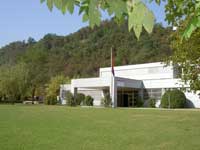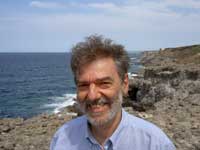A science teacher on air Inspire article
Marco Martucci tells Eleanor Hayes what science teaching and radio journalism have in common.

and the largest city in Ticino
Image courtesy of Lugano
Tourism
When explaining a particularly interesting topic in class, have you ever wished you could tell the world about it? Explain what makes the structure of the cell so fascinating, why we need Newtonian physics to visit Mars, or the chemistry involved in an oil spill? Marco Martucci does just this, combining his teaching job with presenting a weekly radio show on science.
How did that happen?
After his chemistry degree in Zurich, Switzerland, Marco began working as a chemist in industry, but it was not the right job for him. “I like to communicate, I like to explain, and it was not possible there. It was interesting but it was a closed world.” He thought teaching sounded more satisfying – and he was absolutely right. After re-training as a teacher, Marco began teaching general science to children aged 11-15. “I enjoy teaching that age group more than older students: they can do several topics and are not limited in lessons to biology, or chemistry, or physics. They are very receptive to that – they are curious, they want to know, and I enjoy that too.”

and the largest city in Ticino
Image courtesy of Lugano
Tourism
Marco began writing the occasional article for newspapers in Ticino – the only Swiss canton in which Italian is the sole official language. He wrote about chemistry, of course, but also about two of his other passions – nature and cutting-edge science in general. His newspaper articles were popular, and soon he was approached to transfer his talents to another medium: radio. Marco was offered his own radio show: each week, he had seven minutes to educate, enchant and engage his audience with scientific topics of the day.
Over the past 15 years of doing his programme, ‘La scienza, la natura, le cose’ (Science, nature, things)w1, Marco has covered chemistry, nature, astronomy, aeronautics, nuclear energy, stem cells, climate change, genetically modified organisms, the oil spill in the Gulf of Mexico, and many more topics. “I think it’s important that the general public are well informed about science, because there is a lot of misleading information available. It’s incredible what people don’t know! So I try to correct this – not only at school but also via my radio show.” And he clearly succeeds – in 2002, he was awarded the Prix Media, the Swiss Academy of Sciences’ national award for science journalism.
Clearly, despite his wide interests and impressive scientific knowledge, Marco cannot be the expert on all topics. Fortunately, he has a very wide network of contacts – in research institutes, at universities and in industry. “This is very important for a journalist, but of course it’s also very useful for my work as a teacher – having direct contact with these people. It’s a big benefit for my teaching, and one of the reasons why my head teacher allows me to take the time to do the radio show. After all, music teachers often play in orchestras – similarly, there is a synergy between my two jobs. As a teacher, one of the risks is not being up to date in your field – especially in science. But my work for the radio keeps me up to date, enabling me to introduce cutting-edge research to my school students. They are very receptive to it, because they hear about the topic on television and the next week in school, we can talk about it.”
The school curriculum itself is not always very up to date, so introducing cutting-edge science in lessons can be a problem. Marco, however, feels that this is something that can be done, given the right materials and some imagination. “For example, Science in School is a very, very good journal,” he says.

Media Barbengo, in Lugano,
Switzerland
Image courtesy of Marco
Martucci
I’m hardly likely to disagree. Marco has obviously long been a fan of the materials produced by EIROforumw2, the publisher of Science in School, and by its members. “In 2002, EIROforum produced a very good teaching kit – Couldn’t be without itw3 – showing the links between modern science and everyday things like CDs or lasers, our energy supply or medical treatment. The European Space Agency also produces excellent teaching materials – we used some of their International Space Station materialsw4 in the classroom last week, and I got the students riding a skateboard!”
And indeed, we are talking during the lunch break of a conference at the European Molecular Biology Laboratoryw5 – a conference all about sex. Marco is collecting material for his radio show but also for future lessons. And the conference should offer ample opportunity – as its topics include the evolution of sex, the biology of intersex, as well as ‘male’ and ‘female’ brains.
With this wealth of materials to choose from, I ask, how does Marco select the topics for his radio show?
“I get ideas from the scientific topics that are in the news, but sometimes I decide to explain a topic that isn’t particularly current – because I feel people need to understand more about the cell, for example. But I’m always on the lookout for new topics. As a teacher and a journalist, my antenna is always switched on, 24 hours a day. Fortunately, my wife is very patient about it!”
And who does Marco address his radio programme to?

Image courtesy of Marco
Martucci
“When you’re on the radio, you never know who is listening. It could be a scientist, a very simple person or even a child. So I try to tell a story that is understandable without being patronising, but above all, it has to be scientifically accurate. So if I’m going to talk about something that’s outside my field – remember I’m a chemist – I consult people before I write the show. If possible, I speak to the scientist, or at least with the press officer [at the scientist’s institution]. I want to make sure that what I say is correct – if I can’t check, I don’t say it.”
If only all journalists were that meticulous. Perhaps more science teachers should take to the airwaves?
Web References
- w1 – To listen to podcasts of Marco Martucci’s radio programme, ‘La scienza, la natura, le cose’ (Science, nature, things), visit: www.rsi.ch/podcast
- Previously, the programme was known as ‘Dentro le cose’ (Inside things) and ‘Natura sott’occhio’ (Nature watch).
- w2 – EIROforum, the publisher of Science in School, is a collaboration between eight of Europe’s largest inter-governmental scientific research organisations. To learn more, see: www.eiroforum.org
- w3 – Produced in 2002 by EIROforum, the publisher of Science in School, the ‘Couldn’t be without it’ teacher kit can be downloaded free of charge. See:http://scitech.web.cern.ch/scitech
- To support the malaria activity in the teacher kit, videoed interviews with the following scientists can be downloaded here:Fotis C. Kafatos
- w4 – The European Space Agency (ESA)’s DVDS (Missions 1-4) about the International Space Station (ISS) and ISS education kit – together with a wealth of other education material – can be downloaded or ordered from the ESA website (click on ‘Online material’): www.esa.int/educationmaterials
- ESA is Europe’s gateway to space, with its headquarters in Paris, France. It is a member of EIROforum, the publisher of Science in School. For more information, see: www.esa.int
- w5 – The European Molecular Biology Laboratory is Europe’s flagship laboratory for the life sciences, and a member of EIROforum – the publisher of Science in School. To learn more, see: www.embl.org
